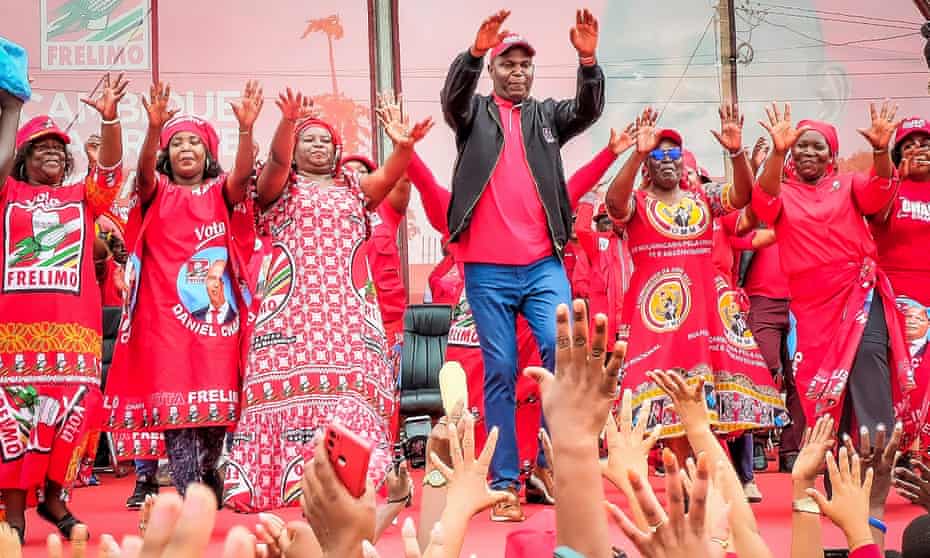Mozambique ruling party likely to win elections despite dissatisfied youth
Mozambicans go to the polls on Wednesday in elections that the ruling Frelimo party is expected to win easily, even as an outsider candidate is shaking up the presidential race and winning over young voters in a country where the median age is just 17.
Frelimo has ruled the southern African country since the end of Portuguese colonial rule in 1975. For the first time, it is fielding a presidential candidate born after independence, Daniel Chapo, a provincial governor who was relatively unknown until being picked in May as the candidate to succeed the outgoing president, Filipe Nyusi.
Frelimo’s traditional political rival is the Renamo party, its opponent in a civil war that lasted from 1977 to 1992 and cost an estimated 1 million lives. But Venâncio Mondlane, who left Renamo in June to run as an independent in the presidential election after failing to oust its leader, Ossufo Momade, has been winning over young voters.
Analysts say they do not expect Frelimo to relinquish its grip on power, though, having made campaigning and voter registration difficult for its opponents.
“The election is never difficult for an authoritarian regime,” said Borges Nhamirre, a researcher at the Institute for Security Studies, a South African thinktank. “No matter what happens, the final result doesn’t depend on the voters’ will.”
Mondlane, whose charismatic speeches at late-night rallies have drawn passionate crowds around the country, has pushed other candidates to use social media more, Nhamirre said, and to pledge to renegotiate contracts in the natural gas and mining sectors.
“Mondlane is a gamechanger … If this was a fair and free election, at least Mondlane would be the second [placed] candidate,” he said. Frelimo could rig the election to ensure Renamo’s Momade comes second, though, Nhamirre added, to neuter Mondlane and stop him inspiring other outsider politicians.
Mozambique is the world’s eighth poorest country, according to the World Bank, with a GDP per capita of just $608. It is rich in natural resources such as coal and rubies, but its efforts to exploit huge natural gas reserves have been stymied by an Islamic State-linked insurgency in Cabo Delgado, its north-eastern province.
Its economy was devastated when $2bn in corrupt, hidden “tuna bond” loans – named as the debt was ostensibly taken out to fund a state fishing fleet and maritime security – were revealed in 2016, leading the International Monetary Fund, countries and other international financiers to pull funding.
As in many other African countries with booming populations, Mozambique’s educated urban youth are increasingly dissatisfied with the status quo. However, analysts say a playing field that is far from level makes a repeat of the 2019 presidential election likely, when Nyusi won 73% of the vote and Momade just 22%.
Anne Pitcher, a politics professor at the University of Michigan, said: “They’ve already done the rigging before the election. They’ve made it difficult for people to register to vote. In the areas where they are strong, they then make sure that they do a more comprehensive registration.”
The Public Integrity Center, an NGO, said in June there were almost 879,000 fake voters out of 17 million people registered to vote. It claimed a third of all registered voters in Gaza, a southern province and Frelimo stronghold, were so-called ghost voters.
Meanwhile, Mondlane’s candidacy may have excited many young Mozambicans but it has also divided the opposition, said Dércio Alfazema, an independent political analyst.
“People are not very satisfied with the country’s situation and many voters will vote against Frelimo,” he said. “But I don’t think these votes will be enough to remove Frelimo from power.”









.png)



0 Comments
Yorum ekle